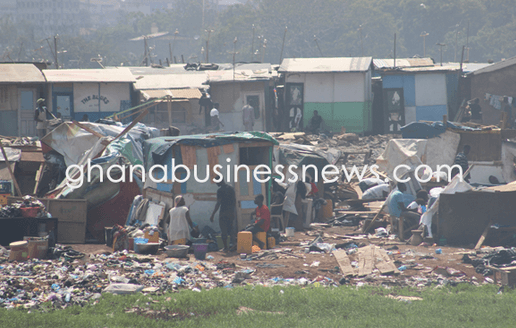Accra has 300 slum settlements and still counting
 A whopping 300 slum settlements in different stages of development have been identified in Accra, a recent study conducted by Peoples Dialogue (PD) Ghana has revealed.
A whopping 300 slum settlements in different stages of development have been identified in Accra, a recent study conducted by Peoples Dialogue (PD) Ghana has revealed.
The areas included; Agbogbloshie, Madina-Zongo, Bawleshie, Newtown, Sukura, Nima, Tema Motorway area and Mamobi.
Of the total slum settlements, 76 of them are already mature, 116 are in its infantile stage, while 108 of the identified areas have the potential of becoming slums because of the influx of immigrants and improper planning.
Dr Prince Anokye, a Senior Lecturer at the Kwame Nkrumah University of Science and Technology disclosed this at a stakeholder workshop to share findings of an action research in Accra.
Dubbed, “improving governance, voice, and access to justice in Ghana’s informal sector,” the study seeks to strengthen the voice, improve access to justice and basic services and thereby improve socio-economic conditions for informal settlements through evidence from exclusions, urban governance tools and public solutions.
He said the study, which sampled 603 households, in Nima, Madina-Zongo and Agbogbloshie revealed that the level of legal education among slum dwellers was very low.
“In some of the questions, we asked slum dwellers to mention the type of rights they had and it will interest you to know that majority of them said they had right to vote.
“If we give them education on these issues they will be able to demand some of these rights,” Dr Anokye said.
The senior lecturer said there was the need to adopt a two-prong approach; the preventive and creative approach to address the housing problems.
Alhaji Boniface Abubakar, Minister of Inner-City and Zongo Development in a speech delivered on his behalf by Dr Kwadwo Ohene Sarfoh, a Special Advisor said one of the vital areas of concern for social cohesion in the country was development to take place in the Inner cities and the Zongo communities.
He said the current state of communities in the country reflected poor sanitation, lack of potable drinking water, lack of health facilities, illiteracy, poor road networks, and unplanned housing.
Alhaji Abubakar noted that the Inner-cities and Zongos required face-lifts with new school buildings to include; Senior High Schools and tertiary institutions.
“The Zongos require more clinics and modern markets, good layouts with good roads and modern places of convenience. The Ministry has therefore prepared a plan based on four thematic areas to deliver on its mandate, namely: infrastructure and Sanitation Enhancement, Social and Economic Development, Crime and quality Control Heritage and Cultural Promotion,” he said.
Alhaji Abubakar noted that the Ministry would engage communities, mobilise resources, coordinate efforts, collaborate with partners, oversee interventions and align mandates to ensure that the envisaged goals of transforming the Inner-cities and Zongo communities into prosperous, inclusive and sustainably develop communities in the country were reached.
“The Government of the Republic of Ghana, in addition to endorsing international treaties, is making conscious efforts to fulfil its constitutional mandate to ‘secure and protect a social order founded on the ideals and principles of freedom, equality, and justice while protecting and promoting all other forms of human rights and freedoms,” he said.
The event was organised by the Land Resource Management Centre (LRMC) with support from the Peoples Dialogue on Human Settlements (PD) and Kwame Nkrumah University of Science and Technology (KNUST) and the International Development Research Centre (IDRC) of Canada.
Source: GNA
